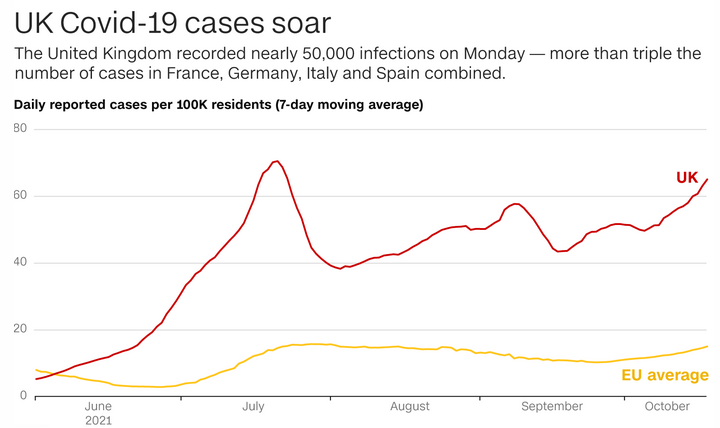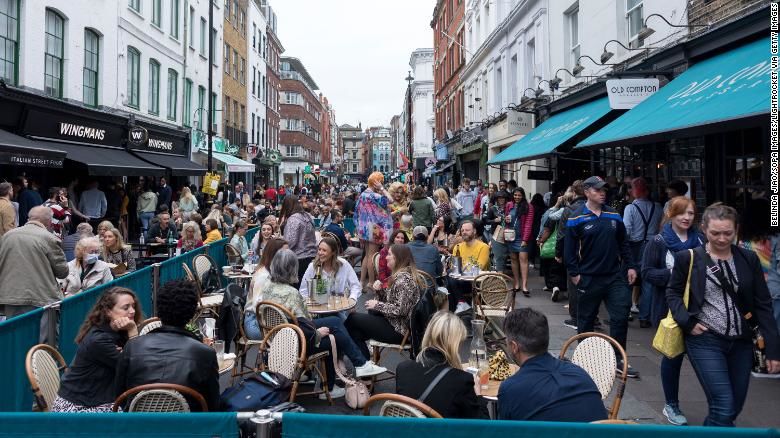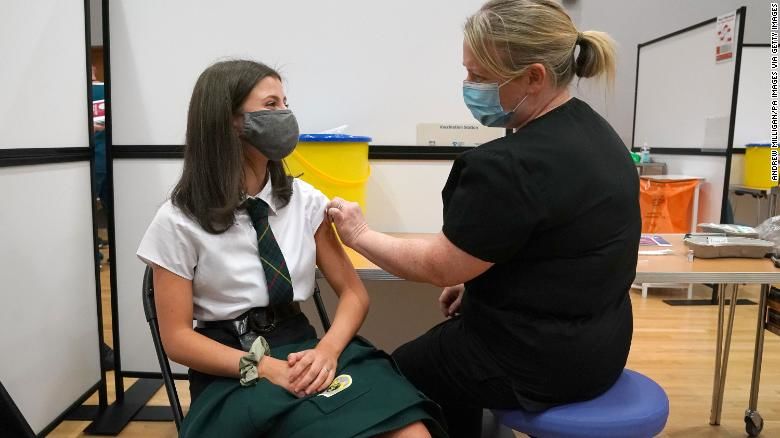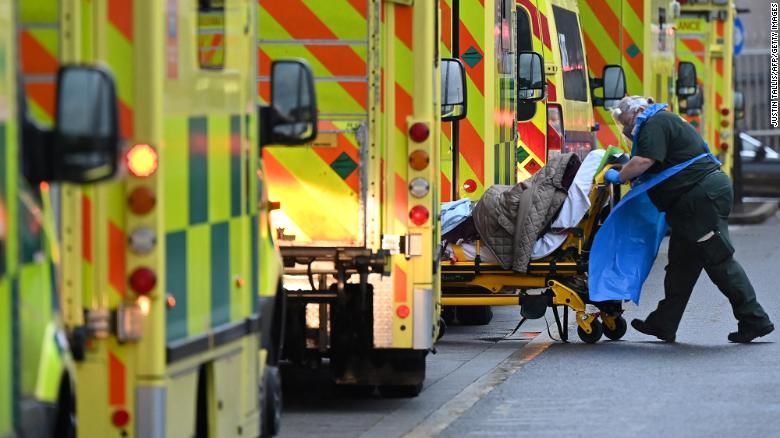
The UK has more new Covid-19 cases than France, Germany, Italy and Spain combined
"We are sacrificing our chance to see loved ones this Christmas, so we have a better chance of protecting their lives so we can see them at future Christmases," Johnson said, taking a potentially career-defining step that he had ruled out just days earlier.
Ten months later, the UK's attitude towards the Covid-19 has changed beyond recognition. Virtually all of England's restrictions were lifted in July, with the events and hospitality sectors returning to full capacity as Johnson urged Britons to "begin to learn to live with this virus."
But the Delta variant -- more transmissible still than the Alpha strain which wrecked last year's festivities -- has not gone away.
The country has quietly endured stubbornly high cases, hospitalizations and deaths when compared to the rest of Europe. Britain has registered nearly half a million cases in the past two weeks -- and almost 50,000 on Monday -- more than France, Germany, Italy and Spain combined. The UK reported 223 deaths on Tuesday, the highest daily figure since early March.
Johnson has strayed from much of the European Union in his approach; while a number of countries on the continent have introduced vaccine passports, England halted its original plan to do so. Mask-wearing and social distancing and other measures are no longer required by law in Britain.
That contrasts with far stricter measures in several European nations, where proof of vaccination or a negative test are needed to visits bars and restaurants or work in several fields, including healthcare.

Hospitals in Britain are now close to buckling once again under the strain of new admissions. And the country's early vaccination success risks being undone by a stuttering rollout of booster shots and shots for children.
"Exceptional policies lead to exceptional outcomes," Deepti Gurdasani, an epidemiologist at Queen Mary University in London, told CNN. "It's very predictable. This is a consequence of opening everything up."
"We're approaching winter, and things are only going to get worse," she added.
Some things may yet shut back down; Johnson's spokesperson admitted on Monday that a "challenging" winter lies ahead, and the Prime Minister has refused to rule out a return of mask mandates or stronger restrictions to protect the country's National Health Service (NHS) in the coming weeks.
But some experts are clamoring for a more urgent change in approach.
"There's a whole series of ways (in which) we're out of line with western Europe and the rest of the world," said Martin McKee, professor of European Public Health at the London School of Hygiene & Tropical Medicine.
"We've seen in other European countries that collective measures make a big difference," he said. "We should be asking ourselves: Are we right? (Because) there's no evidence that we are."
 Diners in London after the UK's restrictions were lifted this summer.
Diners in London after the UK's restrictions were lifted this summer.
A stuttering vaccine rollout
The driver behind Britain's renewed optimism in the new year was its vaccination program, which outpaced most countries in its initial scale and set the narrative for what Johnson portrayed as Britain's triumphant emergence from the pandemic.
But the country is struggling to repeat those early successes as it attempts to vaccinate adolescents and roll out booster shots to elderly and at-risk people.
"England's booster rollout is failing to keep pace with the rollout of first and second vaccine doses," John Roberts, a consultant at the Covid-19 Actuaries Response group which tracks vaccination figures, warned in a statement on Monday.
More than a month after booster shots began, less than half of twice-vaccinated over-80s have received a top-up. "It's clear that accelerating the booster rollout is vital to reduce the pressure on health services and minimise Covid-related deaths this autumn and winter," he said.
The group estimated that, at current pace, the 22 million people that make up the country's higher-risk groups won't be triple-vaccinated until late January, despite initial government promises that the program would protect people for the winter.
Vaccines continue to reduce the number of Covid-19 patients who need hospital treatment, but waning immunity makes the pace of the rollout particularly important. The majority of over-40s in Britain were originally vaccinated with the partially homegrown Oxford-AstraZeneca vaccine, whose efficacy against the Delta variant has been shown to be lower than Pfizer and Moderna's shots.
A preprint of a study by Public Health England (PHE) found that the shot's protection against infection fell from 66.7% to 47% after 20 weeks, compared to a drop from 90% to 70% for the Pfizer vaccine. Separate PHE research found that AstraZeneca's efficacy against hospitalization from Delta slipped from just above 90% to just under 80% after 140 days, while its efficacy against death remained close to 90%. Pfizer remained above 90% in both metrics.
Many experts blame the lack of momentum in the UK's vaccination drive on months' worth of positive reassurances from Johnson's government.
"All of the government's messaging and actions suggest that we're out of danger," Gurdasani said.
"There's been a lot of messaging that the pandemic is essentially over, so a lot of people are thinking: "why bother?" added McKee.
 Teenagers in England must wait to be vaccinated at school, which has hampered the rollout.
Teenagers in England must wait to be vaccinated at school, which has hampered the rollout.
There are concerns too at the other end of the age spectrum, as the NHS works to vaccinate over-12s and avoid a repeat of the rampant transmission in schools that disrupted much of the summer term in June and July.
That program suffered a false start amid conflicting early advice from the country's scientific bodies; whereas France, for example, began vaccinating under-18s in June, the British government only green lit the move in September.
1.2 million teenagers have now been given one dose of a vaccine and just 260,000 have seen two doses in England.
"The problem is not that adolescents don't want to take it. There are many who are desperate to get it, but are not being offered it at school yet," Gurdasani said.
Schools have complained about a lack of vaccinating staff, and England's delay in allowing adolescents to visit national vaccine centers has seen it fall behind Scotland in inoculating the age group.
"There's a loss of direction here," McKee said. "It's not clear who's in charge."
Britain's hospitals brace for a bleak winter
Britain's Covid-19 rates soar above much of Europe's, but its mitigation measures remain minimal.
"The government is totally dependent on the vaccination program, which is now going on in a very half-hearted way," McKee said. "There really needs to be an urgent review of where we are different from other countries, and an assessment: should we be different? What is the rationale?"
McKee joined many experts in calling for a package of measures that mirror the continent. Several European countries, including France and Italy, have rolled out Covid-19 passes and required vaccination for healthcare workers, while many more still employ mask mandates in crowded spaces that the UK does not.
Johnson, by contrast, has walked back initial plans to introduce similar measures. "Vaccine passes have an important role to play; the French and the Italian experience show that they do," McKee said. Cases have remained low in both countries since the measures were introduced.
Health care is devolved in the UK and vaccine passes have been announced in Wales and Scotland. Johnson is meanwhile keeping them in reserve under its "Plan B" scenario for England -- but with such high infection rates every day, many wonder why Plan A is still in effect.
"We have extremely high infection rates in children (and) they've spilled over into the elderly population," Gurdasani said. "We're approaching winter, and things are only going to get worse."
Covid fatigue amongst the public is another challenge. Mass events are underway with no vaccination requirements and little trace of the pandemic still remains on British high streets during busy periods.
Just 40% of Britons still regularly practice social distancing, compared to 62% in mid-July and 85% in April, according to the Office for National Statistics. The same recurring study has also found a gradual decline in mask-wearing.
For some, that trend is alarming. "We've had 30 to 40,000 cases every day for months now. There's no other country that's tolerating that ... (but) it's been normalized" in the UK, Gurdasani said.
 A row of ambulances in London in January. Health staff fear similar scenes this winter if infections continue to climb.
A row of ambulances in London in January. Health staff fear similar scenes this winter if infections continue to climb.
The steady stream of hospitalizations has not dramatically surged in the past two months, but has not noticeably declined either; official figures show more than 700 new patients entering facilities every day.
That leaves hospitals, already struggling to work through a backlog of treatments that were delayed during the pandemic, anxiously awaiting another winter surge.
Last week, NHS England said more people were waiting for treatment than at any time since it started keeping records -- 5.7 million -- while health care staff battled the busiest September on record this year.
"There is no doubt the NHS is running hot, with the highest ever number of patients seen in A&E in September, 14-times as many covid patients in hospital compared to the same month last year and record 999 ambulance calls," Professor Stephen Powis, the NHS national medical director, said of the figures.
Which direction the winter takes is still not inevitable. "There's so many unknowns," McKee said, noting that previous anticipated spikes in infections this year have not materialized.
But experts and hospital staff fear a further strain. "It's not a place where most healthcare workers want to be," added Gurdasani. "It really scares me that we're in this place ahead of the winter."
And, as the year winds down, the nature of Britain's second pandemic Christmas remains unclear.











